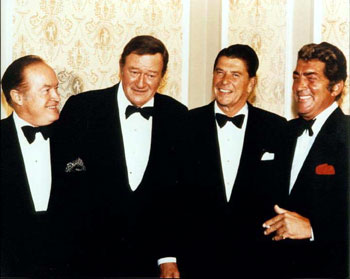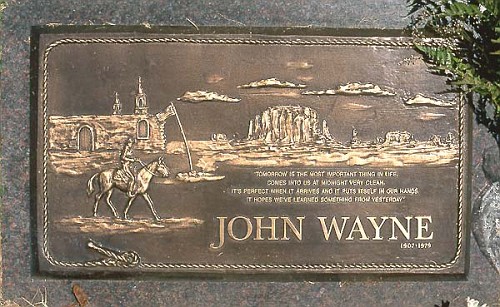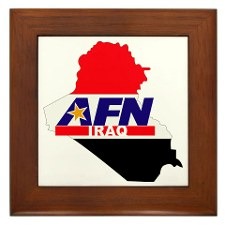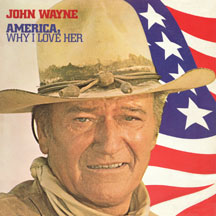In more than 200 films made over 50 years, John Wayne saddled up to become the greatest figure of one of America's greatest native art forms, the western.
The movies he starred in rode the range from out-of-the-money sagebrush quickies to such classics as "Stagecoach" and "Red River." He won an Oscar as best actor for another western, "True Grit," in 1969. Yet some of the best films he made told stories far from the wilds of the West, such as "The Quiet Man" and "The Long Voyage Home."
In the last decades of his career, Mr. Wayne became something of an American folk figure, hero to some, villain to others, for his outspoken views. He was politically conservative and, although he scorned politics as a way of life for himself, he enthusiastically supported Richard M. Nixon, Barry Goldwater, Spiro T. Agnew, Ronald Reagan and others who, he felt, fought for his concept of Americanism and anti-Communism.

But it was for millions of moviegoers who saw him only on the big screen that John Wayne really existed. He had not created the western with its clear-cut conflict between good and bad, right and wrong, but it was impossible to mention the word "western" without thinking of "the Duke," as he was called.
Mr. Wayne was co-director and star of "The Green Berets," a 1968 film that supported the United States action in Vietnam. The movie was assailed by many major critics on all grounds, political and esthetic, but the public apparently did not mind; in only six months, it had earned $1 million above its production cost of $7 million.

Won Growing Respect
As the years passed, Mr. Wayne was recognized as some sort of American natural resource, and his various critics, political and film, looked on him with more respect. Abbie Hoffman, the radical of the 1960's paid tribute to Mr. Wayne's singularity. Reviewing "The Cowboys," made in 1972, Vincent Canby, film critic of The New York Times, who did not particularly care for it, wrote, "Wayne is, of course, marvelously indestructible, and he has become an almost perfect father figure."
But years before he became anything close to a father figure, Mr. Wayne had become a symbolic male figure, a man of impregnable virility and the embodiment of simplistic, laconic virtues, packaged in a well-built 6-foot-4-inch, 225- pound frame.

Overcame Great Odds
Appearances were not altogether deceiving. Mr. Wayne loved adventure and the outdoors. He did believe that things were either right or wrong, and he came back against great odds. In 1964, a malignant tumor was removed from his chest and left lung, and within several months he was on location making another movie.
Mr. Wayne made his last public appearance at the Academy Awards ceremony in April, where he drew an emotional standing ovation when he strode out on stage to present the Oscar for best picture.
He was recently presented with a special Congressional medal of the kind given to such national figures as the Wright Brothers.
Between his first starring role in "The Big Trail" in 1930, and his last one, as the most celebrated gunslinger in the West who finds he is dying of cancer in "The Shootist," in 1976, Mr. Wayne shot his way through generations of film fans with little change in style or personality. He had consciously adapted his posture for that first movie and retained it. He was sometimes inseparable from it in the flesh.

Famous movie quotes
- "I'm looking at a tin star with a ... DRUNK pinned on it." ("El Dorado")
- "I won't be wronged, I won't be insulted, and I won't be laid a hand on. I don't do these things to other people, and I require the same from them." (The Shootist)
- Speaking to his young cavalry lieutenants: "Don't apologize—it's a sign of weakness." (She Wore a Yellow Ribbon)
- "Fill your hand, you son of a bitch!" (True Grit)
- "That'll be the day!" (The Searchers - Spoken several times; inspired Buddy Holly to write a song with that title.)
- "Pilgrim." (The Man Who Shot Liberty Valance - Reportedly he used the expression "Pilgrim", as in "tenderfoot" or "dude" or "amateur", 23 times in that film, and once also in McLintock. It became a catchphrase for impressionists such as John Byner, and Rich Little)
- "I haven't lost my temper in 40 years; but, Pilgrim, you caused a lot of trouble this morning; might have got somebody killed; and somebody oughta belt you in the mouth. But I won't. I won't. The hell I won't!" (He belts him in the mouth). (To Leo Gordon in McLintock!)
- "Out here, due process is a bullet!" (To anti-war journalist David Janssen in The Green Berets)
 ~~America, Why I Love Her~~
~~America, Why I Love Her~~
